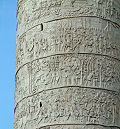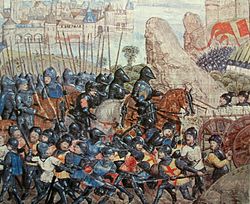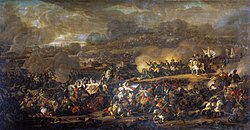Army
The army is the part of a country's military that fights on the ground. People in the army are called soldiers. Many modern armies have vehicles such as tanks, airplanes, and helicopters to help soldiers fight on the ground.
A soldier may be a volunteer and so choose to serve, or he may be forced by the government to join the army. by conscription, also called the "draft.". Voluntary armies tend to be small by numbers but high in confidence and quality. Drafted armies are large but often lack confidence and quality since it may be very difficult to force someone to risk his life against his will. Sometimes, an army is made up from mercenaries, who fight for pay and have little loyalty to the country that they serve.
Soldiers do many things from shooting enemies to digging defensive trenches. They defend their country or attack another country's army. That is difficult, and soldiers must be in good shapeboth physically and mentally. They almost always move together, which allows the team to do more things more safely. They may be assigned to certain places to guard, or they may be told to search a place, or even attack it. That is up to their commander. Every soldier answers to someone else and so everything is organized.
Sometimes, when a country's army is busy in different places, and there are not enough soldiers to do more, a country hires civilians to do some of the army's jobs like protecting buildings and important people and convoys of trucks traveling from one place to another. Usually, the country hire veterans who were members of the military before leaving and working elsewhere.
Working in the army and wearing the uniform is called "service." A soldier will never say "I work as a sergeant in the signal corps" but always "I serve as a sergeant in the signal corps" or other rank, specialty. and unit. Only civilian workers who do not wear uniform speak about "working" in the army.
Military strength
Despite the growing importance of military technology, military activity depends above all on people. For example, the British Army declared in 2000, "Man is still the first weapon of war."[1]
| Country | Manpower |
|---|---|
2,185
| |
1,445
| |
1,400
| |
1,300
| |
1,014
| |
654
| |
600
| |
525
| |
482.5
| |
480
| |
450
| |
405
| |
400
| |
361
| |
355
| |
|
Source: Global Firepower Index[2] | |
Discipline
The function of the army is based on discipline. That means that soldiers unquestionably carry out the orders that they have received and obey their superior officer or non-commissioned officer. There is only one exception: orders that violate the human rights or international law must not be obeyed. as it is considered a war crime. The chain of command is expressed by the military rank system and hierarchy.
Gear
A soldier is supplied with weapons, such as guns, knives, and other simple gear for surviving in the battlefield, such as food, water, clothes, and tents. They must keep good care of the items. Some soldiers train to be a doctor for the army or other civilian duties.
Qualifications
Before a soldier joins the army, he must qualify to be in it first. The person is put through tests so that the army will know if the recruit can do it. That is sometimes called "boot camp." He must complete mental and physical tests. Where he is testing affects how hard it difficult the tests are. He will also take tests to determine what job he will do in the military.
For instance, he may work with computers and be a member of the signal corps or be a cook for the soldiers, he may have been a construction worker in civilian life and be a military engineer, he may become a truck driver and serve in logistics, or he may be very good with a rifle and be a sniper in the infantry. There are many jobs that a person can choose to do in the army.
Branches
There are traditionally six branches of service in the army:
- Infantry, foot soldiers who fight with rifles and other light weapons
- Cavalry, mounted soldiers. Today tank has replaced horses and cavalrymen are called tankers.
- Artillery, soldiers who operate cannons, howitzers and mortars. They provide fire support for infantry.
- Military engineers, soldiers who build things and demolish (blow up) things and handle explosives.
- Signal corps, soldiers who operate communications, radios, radars, signaling and computers.
- Logistics, which carry supplies (food, fuel, ammunition, medicines etc.) to other branches and replenish them.
Army Media
Azerbaijan Army soldiers at a 2020 parade
Indian Army soldiers on parade in 2014
An Ancient Greek warrior in bronze, Riace bronzes, c. 450 BCE.
A 2nd-century depiction of Roman soldiers on Trajan's column
Armies of the Middle Ages consisted of noble knights, rendering service to their suzerain, and hired footsoldiers
Swiss mercenaries and German Landsknechts fighting for glory, fame and money at the Battle of Marignan (1515). The bulk of the Renaissance armies was composed of mercenaries.
The colonels of the French Guards and British guards politely discussing who should fire first at the Battle of Fontenoy (1745). An example of "lace war".
The battle of the Nations (1813), marked the transition between aristocratic armies and national armies. Masses replace hired professionals and national hatred overrides dynastic conflicts. An early example of total wars.
British Indian Army personnel during Operation Crusader in Egypt, 1941
Related pages
- Air force, the part of the military which operate airplanes to bomb or dogfight.
- Navy, the part of the military which fights with warships on the sea.
- Marines, the part of the military that fights in air, land, and sea.
- Coast guard, the part of the military that protects a nations border with seas, lakes, oceans and other bodies of water that are important to national security.
References
- ↑ British Army (2000). "Soldiering: The military covenant" (PDF). Retrieved 2017-12-13.
- ↑ "Active Military Manpower (2021)". www.globalfirepower.com. Retrieved 2021-08-16.









